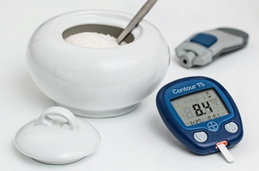Diabetes: a widespread disease

Too many calories and too little exercise have caused the number of new cases of obesity and diabetes to skyrocket. But new treatment approaches provide hope.
Rapid weight loss, blurred vision, constant thirst and frequent urination - these symptoms may be the first signs of type 2 diabetes. Every year around 300,000 people in Germany fall ill with the so-called sugar disease. "Type 2 diabetes is definitely one of the most serious widespead diseases," says Professor Dr. Jochen Seufert. What used to be a typical old-age disease is affecting more and more people at a younger age. The head of the ward for Endocrinology and Diabetology at the Medical Center - University of Freiburg says that the main cause of the many new cases is obesity resulting from high calorie intake and lack of exercise. But there is also good news: "In contrast to immunological type 1 diabetes, the much more common type 2 diabetes can be influenced by one's own lifestyle," explains diabetes expert Seufert. In less severe cases, blood glucose levels can often be corrected by switching to a healthy diet with plenty of exercise.
New medicines
If a lifestyle change does not suffice to control the blood sugar levels in the common type 2 diabetes disease, additional insulin must be administered via tablets, shots or medication pumps. The latest generation of active ingredients are effective for an especially long time, making it easier for patients to optimize their medication. In combination with regular examinations and training, it is possible to avoid common complications such as damage to the kidneys, nerves or the eyes' retinas, as well as chronic foot wounds. Also, drugs called SGLT-2 inhibitors ensure that more sugar is excreted in the urine instead of passing into the blood. Blood sugar and blood pressure drop, and the patients lose weight. "This minimizes important risk factors for life-threatening cardiovascular diseases such as heart attacks and strokes," says Seufert.
Bloodless blood glucose measurement
There are promising innovations in more than just medicines. Blood glucose measurement is also steadily becoming easier. "In five years, no one will have to prick their finger," the diabetologist says confidently. In the Flash Glucose Monitoring system, a sensor in the subcutaneous fatty tissue on the upper arm or abdomen measures the blood sugar, which can be read as often as required. Continuous Glucose Monitoring devices work similarly, but record the blood glucose levels constantly and even warn against hypoglycemia.
Researching new treatments
Further innovative treatment approaches for type 2 diabetes are constantly being researched and tested. Tubes called EndoBarriers, inserted into the intestines, help to reduce blood sugar and weight in cases of particularly high obesity. In addition, Seufert and his team are tracking down messenger substances that could boost the body's own insulin production and thus stop the advance of the widespread diabetes disease. But the most important contribution can be made by each person themself: "Healthy nutrition and adequate exercise are the most effective precautionary measures", Seufert tirelessly emphasizes.
Well looked after
At the Medical Center - University of Freiburg an interdisciplinary team provides optimal care for around 6,000 diabetes patients each year. Also involved in addition to diabetologists are cardiologists, nephrologists, angiologists, neurologists and ophthalmologists as well as diabetes consultants, nutritionists, physiotherapists, medical chiropodists and orthopedic shoemakers.
Care of pregnant women
A special focus of the diabetes outpatient clinic at the Medical Center - University of Freiburg is caring for pregnant women. Gestational diabetes first appears during pregnancy and requires particularly careful, well-coordinated care, since increased blood sugar levels in the unborn child can lead not only to growth disorders and defects in the development and maturation of internal organs, but also to multiple complications in childbirth.
Trainings for patients
All out - and inpatients and their relatives can take part in individual and group trainings that are regularly offered by the diabetes counseling service of the Medical Center - University of Freiburg. They receive individualized tips on nutrition, medications, blood glucose meters and insulin pumps, and learn to correctly interpret the first signs of low blood sugar. Children and adolescents with diabetes receive care in the Department of General Pediatrics, Adolescent Medicine and Neonatology.
Further education for nursing staff
Diabetes nursing staff receive further training in annual courses. In the two-day compact course, internal and external participants learn what to watch for when looking after and caring for diabetic patients. On the lesson plan, in addition to blood sugar monitoring, are wound management as well as pre- and aftercare in longer operations.
Diabetes is a metabolic disorder
The pancreas does not release the right amount of insulin to completely disperse dietary sugar into the muscles, liver or adipose tissue. The residual sugar remains in the blood. About 95 percent of diabetics suffer from type 2 diabetes, caused by genetic predisposition and environmental factors such as excess weight and lack of exercise. In addition, there are often elevated blood lipid levels and high blood pressure. Around 500,000 people in Germany have type 1 diabetes, usually appearing in childhood and adolescence. This is a congenital autoimmune disease in which the insulin-producing cells of the pancreas are attacked and destroyed by the immune system. Promising treatment approaches currently being explored include the combination of insulin pumps and blood glucose sensors as an "artificial pancreas", and the transplantation of insulin-producing cells.
Back